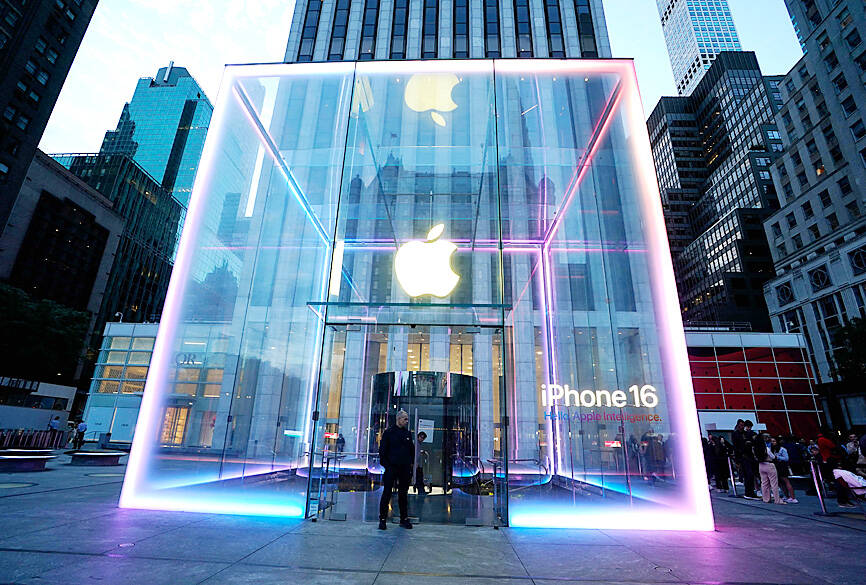Apple Inc has approached its biggest iPhone supplier, Hon Hai Precision Industry Co (鴻海精密), also known as Foxconn Technology Group (富士康科技集團) internationally, about building artificial intelligence (AI) servers in Taiwan, the Nikkei Asia reported on Tuesday, citing sources familiar with the matter.
The servers are intended for Apple’s internal use to help it ramp up its computing capability, so the size of the order would likely be relatively small, the report said.
In addition, Hon Hai’s capacity to take on Apple as a server customer might be limited, as the Taiwanese firm is also the leading manufacturer of Nvidia Corp’s AI servers, it said.

Photo: AFP
Late last month, Apple rolled out its first set of Apple Intelligence features across its premium iPhone, iPad and Mac devices after revealing its AI capability at the company’s developers conference in June.
To allow more consumers to embrace the company’s generative AI features, Apple needs to rely on its manufacturing partners to build the necessary hardware for this goal.
While Apple and Hon Hai have entered into discussions, no agreement has been finalized yet, the report said.
Apart from Hon Hai, Apple has also approached Chinese firm Lenovo Group Ltd (聯想), the world’s largest PC maker, and its subsidiary, LCFC (Hefei) Electronics Technology Co (聯寶科技), to help in designing some of the AI servers, the Nikkei Asia reported.
There is a possibility that more players might enter Apple’s supply chain for this server production plan, as the US tech giant is looking to smaller suppliers, such as Universal Scientific Industrial Co (環旭電子), to provide additional production capacity, the report said.
Still, nothing is set in stone right now, it added.

Vincent Wei led fellow Singaporean farmers around an empty Malaysian plot, laying out plans for a greenhouse and rows of leafy vegetables. What he pitched was not just space for crops, but a lifeline for growers struggling to make ends meet in a city-state with high prices and little vacant land. The future agriculture hub is part of a joint special economic zone launched last year by the two neighbors, expected to cost US$123 million and produce 10,000 tonnes of fresh produce annually. It is attracting Singaporean farmers with promises of cheaper land, labor and energy just over the border.

US actor Matthew McConaughey has filed recordings of his image and voice with US patent authorities to protect them from unauthorized usage by artificial intelligence (AI) platforms, a representative said earlier this week. Several video clips and audio recordings were registered by the commercial arm of the Just Keep Livin’ Foundation, a non-profit created by the Oscar-winning actor and his wife, Camila, according to the US Patent and Trademark Office database. Many artists are increasingly concerned about the uncontrolled use of their image via generative AI since the rollout of ChatGPT and other AI-powered tools. Several US states have adopted

A proposed billionaires’ tax in California has ignited a political uproar in Silicon Valley, with tech titans threatening to leave the state while California Governor Gavin Newsom of the Democratic Party maneuvers to defeat a levy that he fears would lead to an exodus of wealth. A technology mecca, California has more billionaires than any other US state — a few hundred, by some estimates. About half its personal income tax revenue, a financial backbone in the nearly US$350 billion budget, comes from the top 1 percent of earners. A large healthcare union is attempting to place a proposal before

KEEPING UP: The acquisition of a cleanroom in Taiwan would enable Micron to increase production in a market where demand continues to outpace supply, a Micron official said Micron Technology Inc has signed a letter of intent to buy a fabrication site in Taiwan from Powerchip Semiconductor Manufacturing Corp (力積電) for US$1.8 billion to expand its production of memory chips. Micron would take control of the P5 site in Miaoli County’s Tongluo Township (銅鑼) and plans to ramp up DRAM production in phases after the transaction closes in the second quarter, the company said in a statement on Saturday. The acquisition includes an existing 12 inch fab cleanroom of 27,871m2 and would further position Micron to address growing global demand for memory solutions, the company said. Micron expects the transaction to